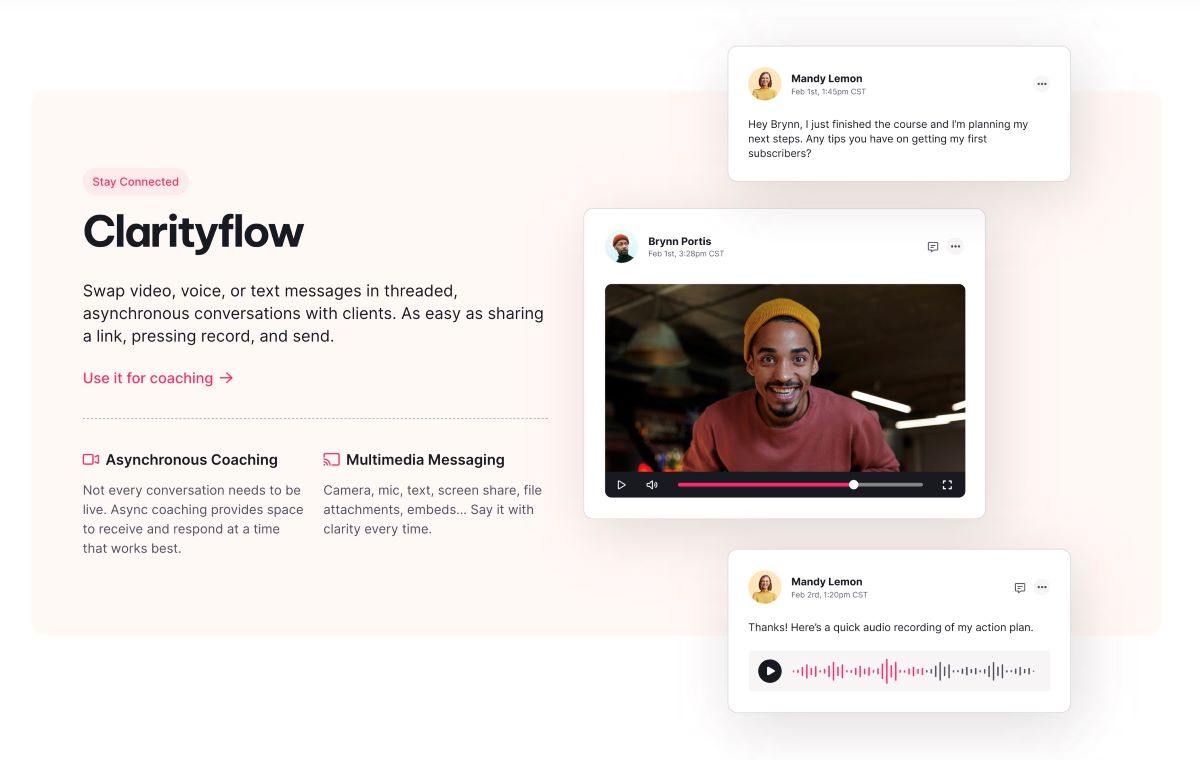Your No-Panic-Necessary Guide to Starting a Coaching Business

Starting any type of business is daunting. But figuring out how to start a coaching business? That feels like an even more intimidating mountain to climb.
Of course, you have all the typical business logistics — pricing, marketing, finding clients, and more — to sort out and manage.
But you also have the added weight of lofty expectations. Clients who work with coaches expect meaningful results. That means the pressure is on you to deliver those transformations (all while you're still sorting out the details of entrepreneurship yourself).
Feeling short of breath? Chewing your nails? Wiping your sweaty palms on your pants? Now's the time for persistence, not panic — and we have your guide to starting a coaching business right here.
Here's what we'll cover:
The joy of coaching: More time, fun, and fulfillment guaranteed
A few reasons why starting a coaching business is more than worth the work.Liftoff? Three must-haves to tell if you're ready to start coaching
Boxes you should check before launching your coaching business.Starting an online coaching business: What you really need
Five steps to take to get your new coaching business up and running.Pricing woes: How the heck much do you charge for this?
Practical questions to help you set your prices.Coaching at scale? How to take it to the next level
Some tips for up-leveling your coaching business when you're ready.
The joy of coaching: More time, fun, and fulfillment guaranteed
We won't deny that there's a lot of work involved in starting and running a successful coaching business. But here's the good news: It's more than worth it. Making your living as a coach offers plenty of advantages, including:
Gratification from helping someone: Most people get into coaching because they genuinely enjoy supporting people. You get to work alongside your clients and experience that rewarding sense of fulfillment as they achieve meaningful results. Even better? You get to do it over and over again (and get paid for it).
Control over your own schedule: Of course, entrepreneurship means you're the one in the driver's seat. Freedom and flexibility are two of the biggest draws of business ownership, as you'll have control over your time and schedule.
Opportunity to pursue your passion: We're willing to bet you have a huge passion for your coaching area—whether it's fitness or finance. Starting a coaching business means you get to fuel your passion day in and day out, all while helping others learn to share your enthusiasm.
Flexibility to expand your business: Coaching can be a stable and meaningful career path on its own. But it's also an opportunity to position yourself as an expert and grow your business beyond coaching. From launching digital products to speaking at conferences to writing a book, you have seemingly endless avenues to build on your expertise.

Liftoff? Three must-haves to tell if you're ready to start coaching
There are plenty of perks and meaningful reasons behind starting a coaching business. But, passion alone (while important) won't get your business rolling.
There are a few more things you need to have in place before you dive headfirst into coaching professionally. Here are three questions to ask yourself before you start looking for your first clients:
1. Do you have a niche?
The most successful coaches are the ones who are focused — they provide guidance and expertise in a specific area or for specific types of clients (or both!).
You might think that a niche would be limiting, but it can be a huge boost to your coaching business. When you're definitive about what you offer, potential clients know when they've found the exact right coach to help them.
So, if you haven't already, take some time to get clarity about what exactly you'll focus on as a coach:
What subjects will you educate people on?
What experience or knowledge do you have in these areas?
What types of clients will you serve?
Not only will this help you find your right-fit clients (and make it easier for them to find you), but it'll also help you establish credibility in your most impactful areas — rather than trying to do a little bit of everything.
2. Have you established credibility?
Speaking of establishing credibility, it's tough to swoop in out of nowhere and launch your coaching offer. The biggest thing you need to be a successful coach is trust, and you can't garner trust if people have no idea who you are.
This can be a sticking point for a lot of new or prospective coaches, particularly if they don't have large existing audiences. However, there are several steps you can take to get your name out there and position yourself as an expert, such as:
Guest posting on related websites
Appearing as a guest on relevant podcasts
Offering free webinars or other educational resources
Posting helpful content on your social media accounts
Writing blog posts for your own site
We'll admit that imposter syndrome likes to pop up as you start to build your identity and showcase your knowledge. But, gather your courage and put yourself out there anyway — it's an important step as you launch your coaching business.
3. Have you tested the market?
You might think you have the perfect coaching focus or program — but it won't get you far if nobody is actually interested in purchasing what you offer. That's why you need to test the waters and see if there's any demand for the type of coaching you plan to do.
Rest assured that this doesn't need to be a complex research process. Simply search for key terms and phrases (e.g. "burnout coach," "burnout coaching," "looking for a burnout coach," "need a burnout coach," etc.) on social media and forums. You can also Google similar terms to see what comes up.
Another good indicator that people are interested in your offering? Acquaintances asking if you provide coaching. That's a solid sign that you've struck something people need and that they trust you to help them.
Need some words of wisdom? Check out what Justin Wise has to say about finding your niche:
Starting an online coaching business: What you really need
You've done the groundwork and now you're ready to crack your knuckles and actually get into the hands-on work of starting your coaching business. Here are your steps to go from overwhelmed to up and running.
1. Iron out your offer
You've already gotten a good handle on what areas you'll coach in and who you serve, but now it's time to get into the details of how you'll do that. What does your coaching offer actually look like? For example:
How long will your typical coaching engagement be?
How many sessions will your clients get with you?
Will those sessions be in-person or remote?
Will those sessions be live or asynchronous?
Will you offer group coaching, individual coaching, or both?
What resources and materials will you create to supplement your coaching?
What tools will clients need access to?
How will you communicate with clients to share feedback, progress updates, etc.?
Your goal here is to get the lay of the land of how you'll execute your coaching offer. That will be helpful as you figure out your pricing (more on that a little later), identify your marketing channels, and more.
2. Sort out the nuts and bolts (yep, the boring stuff)
You probably could've guessed that there are some not-so-glamorous tasks involved in starting your coaching business. They're important but not exactly the stuff that entrepreneurial dreams are made of.
Even so, taking care of them sooner rather than later will set you up for success as you get rolling. Here are a few things to address (deep breaths — you've got this):
Purchase your website domain name (if you haven't already)
Create your website for your coaching business
Create a client contract (or find an attorney or template to help, if you need one)
List your coach title in your social media bios and headlines (e.g. "Fitness Coach") so you show up when people search those platforms
Figure out how you'll track your business income and expenses, whether that's in a spreadsheet or in a platform like Quickbooks or Freshbooks
Again, it's not the flashy stuff, but these tasks are crucial for running a successful, organized, and compliant business.
3. Get the right tools
Whether you're doing remote coaching sessions or not, a good portion of your coaching business will happen online — whether that's promoting your business, communicating with clients outside of sessions, or anything in between.
Having the right tools in your arsenal will make all of those digital responsibilities a lot more seamless.
Exactly what tools you need will depend on how you structure your coaching program and what (if any) tasks you outsource. As you evaluate tools, make sure you look for ones that are:
Applicable to your needs: It's easy to fall victim to "shiny object syndrome" and sign up for that comprehensive coaching platform that everybody's talking about — even when your existing system is working just fine.
As you get your business off the ground, think about the tasks that are really eating into your time and energy. Do you need help with accounting? Are you struggling to onboard your clients? Is communicating with clients a time-sucking nightmare? Identify your needs and then find tools that match those. That's far more effective than finding a grabby tool and trying to make it work for your business.
Easy to use: Particularly if there are certain tools you need clients to use along with you, user-friendliness needs to be near the top of your list. All of your tools should be seamless and intuitive for you and your clients to use. If they aren't? It's not likely that you (or your coaching clients) will actually continue to use them.
Integrated with other tools: There might be some tools you already use that you know you can't live without. If you know those are non-negotiables in your workflow, look for other tools that integrate (or at the very least, play nice) with them. It'll save you a lot of hassles down the road.
Clarityflow is one tool you'll absolutely love for running your coaching business. Clarityflow makes it fast and easy to swap video, audio, or text messages with your clients in a threaded conversation. You can give them the time and personal attention they deserve, without clogging up your calendar with endless meetings.
And even better? Your clients can use Clarityflow without any annoying account creation or clunky downloads.
4. Determine your marketing methods
Starting your coaching business is a big first step — but it's not much of a business if you don't have any paying clients.
Every new business owner is familiar with the daunting challenge of figuring out how to land their first customers. And, when it comes to marketing, it can easily feel like you need to be everywhere at once.
To avoid becoming overwhelmed, focus your efforts on a few strategies or channels that you're confident will be impactful (put simply, the ones that are most likely to reach your target clients). Here are a few popular and effective marketing methods that real coaches have used:
Reach out to your existing network to promote your business
Actively engage on social media platforms and forums
Provide free value in the form of resources, educational social media posts, and more
Connect with other coaches for advice and referrals
Share your expertise on relevant blogs, podcasts, and more
Don't be afraid to experiment either. If one marketing tactic isn't generating the results you expect, change gears and see if something else is more effective.
Still intimidated by marketing? We dig into the ins and outs in our comprehensive guide to getting coaching clients.
5. Continue to iterate and improve
Getting your first client (and honestly, any client after that) is a cause for celebration — and it's also an opportunity for you to learn and improve.
Particularly in those early coaching engagements, pay close attention to what works well and what's a struggle for you and your clients. Is your onboarding process confusing or haphazard? That's an area that you can focus on. Is your payment process clunky? Look for a way to automate payments.
It's also worth seeking feedback from your coaching clients. Ask them what they've enjoyed, what they think could be improved, and what they'd change moving forward. That's valuable insight you can use to keep pushing your coaching business in the right direction.
Pricing woes: How much do you charge for this?
There's another big question that new coaches have when preparing to launch their businesses: How much do I charge clients?
As much as we'd love to spit out straight digits, there really isn't one model that works for everyone. There are several different approaches you could use to price your coaching services, such as:
Pricing by the package or engagement (e.g. $5,000 for your three-month coaching program)
Pricing by the hour (e.g. $150 per hour)
Pricing by the session (e.g. $250 per coaching session)
They're all feasible options, but setting a price for your coaching package is one of the most common ways for coaches to go, as it assigns a value to your program rather than tying your income directly to your time.
As far as how much to charge, well, there's a lot of nuance there too — it can vary based on how much experience you have and even what type of coaching you offer.
For example, data shows that a life coach will usually charge somewhere in the range of $80 to $130 per hour while an executive coach is somewhere between $200 to $500 per hour. If you're relatively new in your chosen industry, you'll likely be on the lower end of any range. If you have plenty of experience, you can justify a higher price.
If you're really feeling lost about what sort of price tag to attach to your program, do some research by:
Looking up similar coaches and programs to see how much they're charging
Connecting with fellow coaches to ask about their pricing approaches
Surveying your existing audience to figure out their comfort range
It can also be helpful to work backwards by setting an income goal. For example, if you know you want to generate $10,000 per month from your coaching business, then you need to sell 10 coaching packages at $1,000 each. Or five at $2,000 each.
You get the idea — it's not a foolproof system, but it provides some structure to your pricing, as opposed to pulling a random number out of a hat because it "sounds right."
As you crunch the numbers, there are a few more important things to incorporate into your prices:
Build in your expenses: What you charge doesn't all go into your pocket. From tool subscriptions to hiring an accountant, you'll have business expenses. If you want to turn a profit (and, of course, you do), what you charge needs to cover those — and then some.
Build in your non-billable hours: From marketing your business to managing contracts, there are certain tasks that are important but don't directly generate revenue. Again, account for those as you set your prices so that you don't spread yourself too thin.
Build in your benefits: When you're self-employed, you don't get employer-provided insurance, paid time off, retirement savings, or any of those other "traditional" benefits. You'll have to pay for them yourself.
Build in your taxes: What you earn from coaching is income, so you'll need to set aside a certain percentage of your earnings to pay income tax. If even the brief mention of taxes made your eyes glaze over, connect with an accountant who has experience working with self-employed people.
Even with a ton of research and strategy, setting your prices can be nerve-wracking. Take some comfort in the fact that nothing is set in stone. You can always adjust your prices as you tweak your services, collect feedback, and keep iterating on your coaching business.
Coaching at scale? How to take it to the next level
When you've launched your coaching business, you're ready to get into the work of actually serving your clients. But, before too long, you'll reach the next step: growing your coaching business.
Maybe you want to stay small and only take on what you can realistically handle yourself — that's a totally possible and admirable option.
But maybe you're hungry for growth and want to scale your coaching business beyond yourself. If you want to level up, there are a few different options to explore:
Use automation: Automation can take a lot of repetitive and mundane tasks off your plate. Whether it's using a templated email sequence to handle new client inquiries or automating your invoicing, look into how you can make better use of your tools to reduce your manual work and free up more time for clients.
Invest in paid advertising: You can get plenty of eyeballs from organic marketing efforts. But paid advertising offers seemingly limitless options for targeting. From running ads on search engines to social media, putting a little money behind your marketing can help you land even more clients.
Build a team: More clients means more to do. If you don't have the time or capacity to handle those added demands and workload on your own, it's time to bring in some help. You could bring in a virtual assistant to take over the administrative responsibilities. Or, you could even train other coaches to work under you. Outsourcing to other people means you can focus on the aspects of your business that you enjoy the most.
Build your dreams (while helping other people pursue their own)
There's nothing quite like the feeling you get when starting a business. It's intimidating yet thrilling. Scary yet satisfying. Overwhelming yet fulfilling.
That rollercoaster of emotions rings true for any type of business. But there's something extra special about launching a coaching business.
After all, you not only get the gratification from reaching your own big dream — you also get to turn around and use your talents to help your clients achieve lofty goals of their own. And what could be better than that?
Want to make client communication easy? Use Clarityflow for all your async conversations. Grab your Clarityflow account here.



